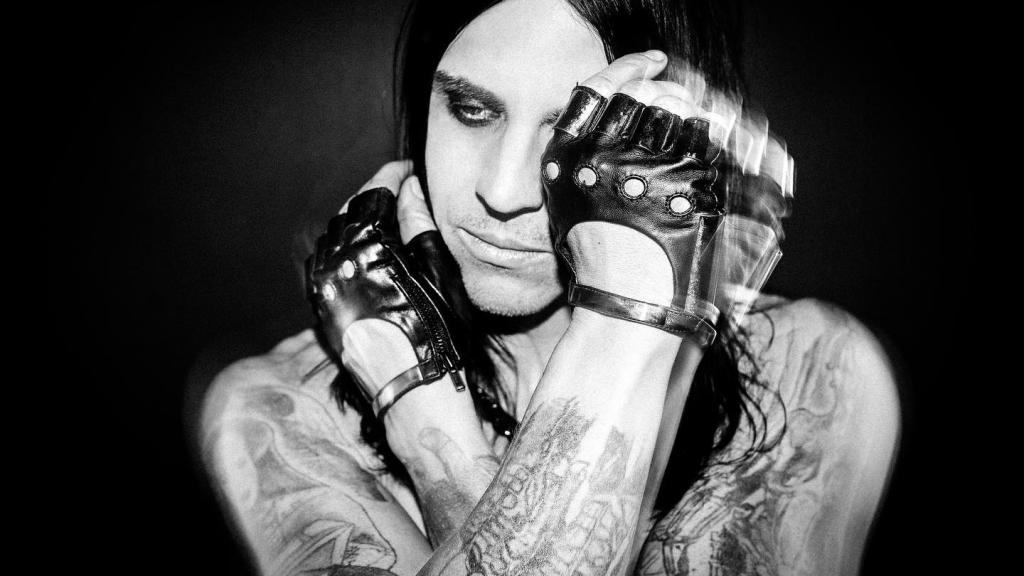Jon Siren is a Los Angeles-based touring drummer known for his work with renowned musical acts such as IAMX, SKOLD, Front Line Assembly, Mankind Is Obsolete, Psyclon Nine and many others. His impressive musical accomplishments are just one aspect of his character that sets him apart. Another notable facet of Jon's identity is his commitment to a vegan lifestyle. In October 2017, Jon released a book titled The Touring Vegan, which combines his personal life story with valuable advice, knowledge, and facts about veganism, a lifestyle choice often misunderstood. The book covers a wide range of topics, including tips on maintaining a vegan diet while on tour and suggestions for leading a healthier lifestyle at home. Throughout the book, Jon shares his own journey and how it has shaped him into the person he is today.
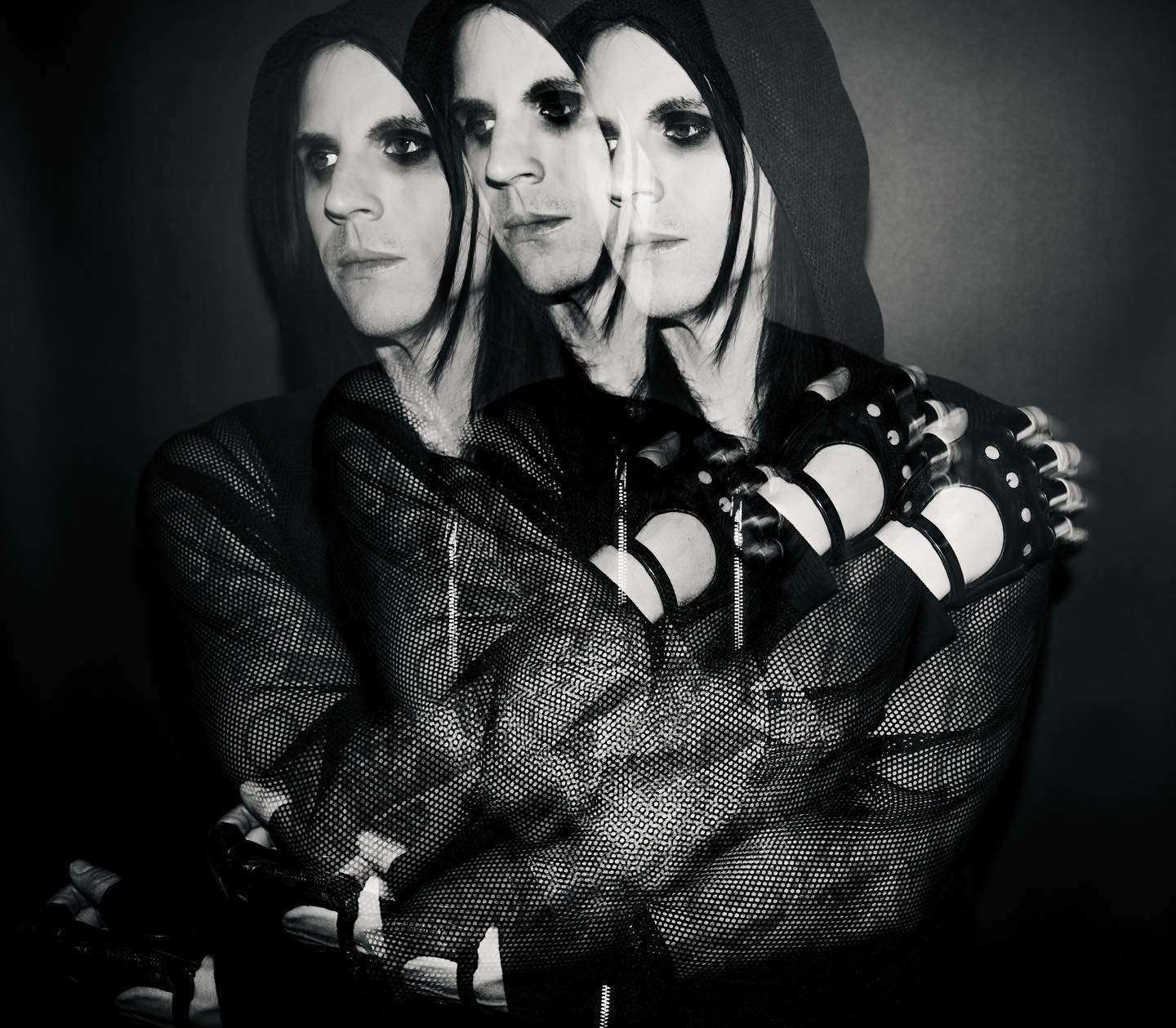
(c) Gretchen Lanham
Thank you for granting me some time. I am excited to have the opportunity to speak with you about your experiences touring with different bands in both America and Europe. It’s a long overdue interview, so let's jump right into it! You grew up in Columbus, Ohio. How was your childhood like? What was your first experience with music?
Jon: Thank you. Yes, I grew up in Columbus, Ohio and we had cable television and with that came MTV. I was very young in the mid 80s, but I was fixated on all of the music videos I saw. I knew from an early age that I needed to be just like the people I saw in these videos. I became obsessed. I would record music videos and watch them later, I would beg my parents for cassettes or CDs and they ended up purchasing a few for me in my early years. I remember having Guns N Roses, George Michael and INXS albums. I liked all sorts of music but would lean more into the heavier stuff as I entered my teenage years. My childhood had many ups and downs. My home life was intense. I was a depressed kid and my dad was as well. He committed suicide when I was a teen shortly after the divorce. He did take me to many shows though and bought me some musical equipment and CDs. I feel fortunate to have had that but I didn't really have the discipline to practice regularly. I was not as focused when I was younger because I was struggling inside so much. When I turned 18, I became very serious about practicing and trying to make music my career.
I am so sorry for your loss and the hardships you went through.
Can you tell us about your journey as a drummer, how did you get started and what motivated you to pursue this path?
Jon: Growing up I always wanted to play the drums. My parents were certainly supportive of me learning to play an instrument but they were hesitant about it being the drums. I started off on guitar and bass. I took some lessons and really enjoyed the bass. I still loved the idea of getting drums and going down that path but it came a few years later when I was a teen. My parents agreed to get me a kit eventually. As I mentioned before, I was unmotivated to practice when I was a kid. It seemed so overwhelming and I didn't enjoy the fundamentals that were being taught to me by music teachers. I regret this very much now, but I really wasn't excelling at drums as a kid. After my dad's death and around the time that I was a senior in high school, I was playing in more bands and that is what made me start to take things a bit more seriously.
Touring with different bands can be quite demanding. How do you manage to adapt to different musical styles and band dynamics while on the road? What are some of the challenges you face as a drummer when touring with different bands? How do you overcome these challenges?
Jon: Playing with several bands that tour regularly does come with many challenges especially because these bands are all fairly different from one another and require different skill sets behind the drums. What I typically do is bring a practice pad kit with me. I'll get up early or maybe when I'm getting ready to go on stage. I'll practice the songs I'll have to play on the upcoming tour. One thing I do to be efficient with my time is to take the most challenging sections of all the music I have to play and I'll start off slow and practice those sections for a bit and eventually speed them up. If I have more time, I'll play through all the music. One of the main challenges to be on the road constantly is that you can't practice in a traditional way always because most of the time I'm traveling or setting up. I do mental practice sessions in these situations where I listen to the songs on repeat and envision the drumming I'll do. I may tap my legs as well. I just have to keep things fresh in my mind so that by the time I need to do the gig, I'm not thinking so much and I can be more present with the music. Other challenges are mainly health ones, I need to eat healthy food, get sleep whenever possible and try to exercise as well. I bring weights and resistance bands with me on tour to stay physically fit.
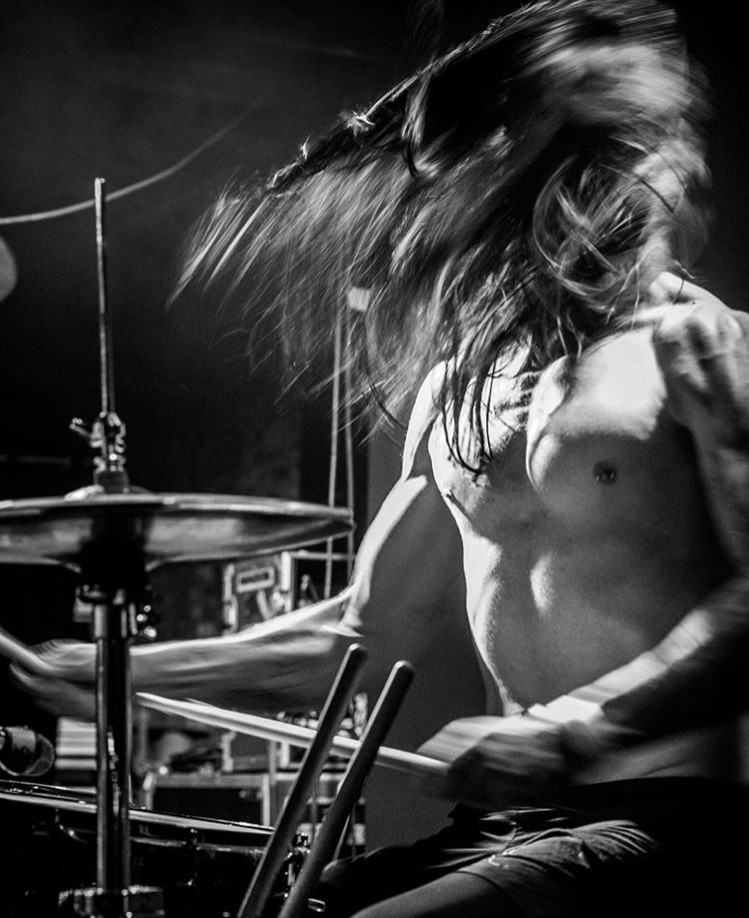
(c) Mike Thorne
Staying healthy on the road must be challenging.
Each band has its own unique sound and stage presence. How do you ensure that your drumming style complements the band's music and enhances their live performances? How would you describe your drumming style?
Jon: In many of the bands that I play in I try to honor the song writer's vision and keep the drums as close to the album as possible. If a band leader wants me to take liberties in certain areas, I can certainly do that but I try to stay close to the original vision as much as possible. That said, we all have our own personalities that show even when trying to adapt to parts that I didn't write. The way I hit the drums will always be unique to me even if another drummer were to follow the same approach. I would describe my drumming style as simple and primal and I try to be a chameleon so that I can weave between styles of music.
I see.
Touring can be physically and mentally exhausting. How do you maintain your energy and focus throughout long tours, especially when constantly switching between bands? Do you have any daily habits while touring?
Jon: Touring is absolutely exhausting. I try to maintain my energy levels by staying healthy year round. I gave up drinking alcohol. I try to make my own meals with fresh fruits, vegetables, whole grains, tubers and legumes. I make sure to exercise year round and I try to get as good of sleep as possible. Each day I get up and exercise for 30-40 minutes, practice on my practice pad kit for an hour, make a big healthy meal in my instant pot and stretch before going on stage. I stay hydrated too. You have to treat your body right if you're going to make touring a career or you'll fall apart and not be able to deliver the goods each night.
Touring often involves spending extended periods of time away from home and loved ones. How do you cope with the emotional challenges of being on the road?
Jon: This is true, touring does keep me from my loved ones and family. It's definitely a lot easier when I've been single because you aren't missing someone each day your gone. Being in a relationship now with FaceTime and texting, it's a lot easier. I can have regular interactions with my partner, family and friends.
Sharing such a confined space with the entire team on the tour bus can undoubtedly pose challenges when it comes to maintaining privacy and finding moments of solitude. How do you manage to preserve your sense of intimacy? How do you find yourself amidst the constant presence of others?
Jon: This is true, we don't get many times to be by ourselves when on tour, so if I really need to isolate, I'll hide in my bunk if we're in transit. If I can have a moment to walk away by myself, I'll go on a short jog to have some alone time. That usually helps. Many of us are introverted even though it may not come across that way as performers, so we have to all be able to read the room and see if our colleagues want to engage in conversation in the common areas or if we should give others their space.
Touring, traveling for years on end, moving from one city to another, from one country to another, from one continent to another; everything is in constant motion. What do you do to feel a little bit at home in these conditions?
Jon: Actually, I feel at home waking up in a tour bus at a venue. I've spent so much time doing this that it feels like my home is the road. That said, home to me is the close relationships I keep with people and not so much a physical space. I live in my drum studio when not on the road because I'm on tour so much and trying to save up for a house. It's comfortable there but not comfortable enough that I'd want to live there long term, so it helps motivate me to stay active and hopefully have what most would consider a normal home someday.
I hope you'll get the house of your dreams.
What are some of the most memorable moments or experiences you've had while touring with different bands?
Jon: I've had many experiences that I'm not sure I'd discuss with the general public that were memorable. That said, I'd say that touring in Russia and Ukraine over the years was always the most memorable places for me. The crowd enthusiasm was unlike no other countries I've been too. The last time we played in Moscow, we headlined at Adrenaline Stadium. That felt like a monumental achievement. I hope to be able to return to some of these places again and that there will be peace eventually.
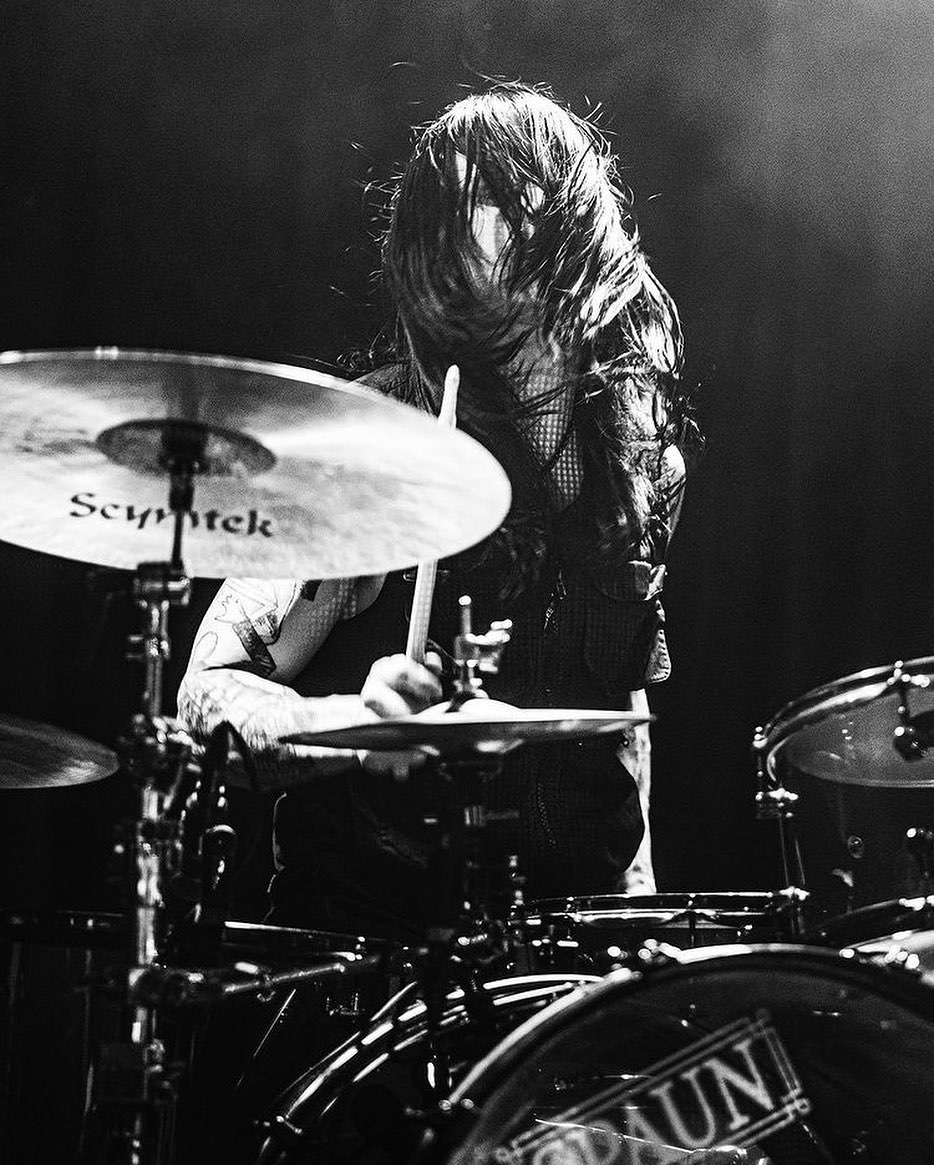
(c) Dan Perez
What advice would you give to aspiring drummers? Any tips for navigating the music industry and building a successful career as a musician?
Jon: Advice I'd give to an aspiring drummer is to practice a lot and really hone your craft. That said, know that you can go far with a limited musical vocabulary so don't feel discouraged by your abilities if you feel like you need to be at a certain level to be professional. Work with what you have, listen to the music, try to complement it, keep an open mind to what a band leader may ask of you and be able to adapt. Take care of your health if you want to do this long term and never stop growing. It's a never-ending journey. As for navigating the music industry, be sure to communicate well with people that may want to hire you. Make sure that you discuss finances before you start a gig. You're going to fumble several times and your journey will be different from mine. If you have a deep calling to do this, you'll make the necessary steps to achieve your goals. Get ready for a lot of hard work and sacrifice but it comes with the joy of travel, meeting lovely people, playing music each night and spreading joy. Keep that in mind when you're depleted and worn out. It's definitely a grind. Just embrace it.
Now, let's shift our focus to your vegan lifestyle. You released a book in 2017 titled The Touring Vegan. Can you tell us more about it?
Jon: I'm coming up on 30 years of being vegan. I wrote that book as a way to discuss my journey and how I stay true to something I believe in dearly even when it's inconvenient to do so. I wanted to give tips and ideas to those who are going down a similar path but struggle on the road and in social situations. Writing the book was so much fun. I did it between tours with IAMX in 2015/2016. Editing it took forever and there are still a couple of small errors in there that people pointed out. My buddy who is a middle school history teacher helped me edit it and it was definitely a more labor intensive job than it was to write it. I've never really liked having conversations about being vegan with others because I felt that people thought I was constantly judging them. I also was terrible at defending my position. I would fumble my words because I felt I had to always hit people with a silver bullet with why they should believe what I believe. I figured that if I wrote a book, I could just put it all into a cohesive format and if I got myself into a discussion, I could say here is why I do this, go read it and come back to me.
For vegans planning to travel, what are some valuable resources or tools you recommend to help them find vegan-friendly options in different cities or countries?
Jon: I would say to travel with a small rice cooker or a pressure cooker. I've gone on airplanes with these in my luggage. This way you can always make healthy meals anywhere with a few ingredients from a grocery store. There are several apps like Happy Cow that can help you find vegan restaurants or places that are vegan friendly. Be prepared, that is key. Have a couple of food items with you so that you aren't starving when you first arrive somewhere.
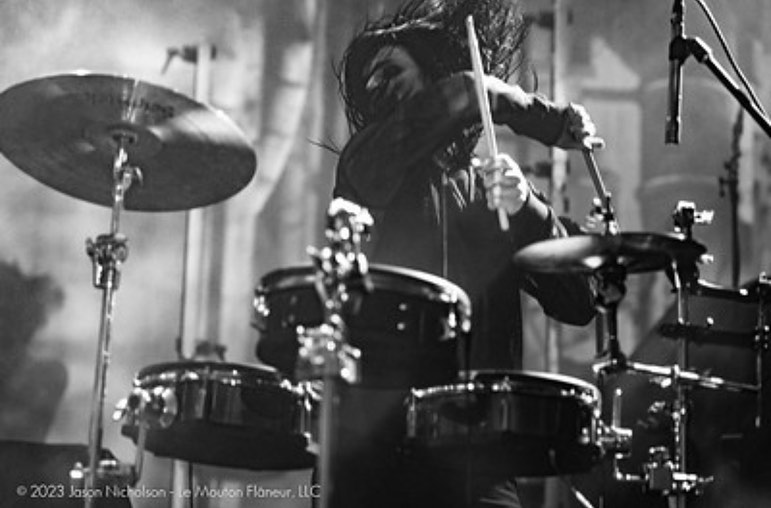
(c) Jason Nicholson
In your experience, which destinations around the world have been particularly vegan-friendly and offered a wide range of plant-based options for you to enjoy while on tour? On the flip side, have you encountered any places that proved to be particularly challenging for vegans in terms of finding suitable food options? How did you manage in such situations?
Jon: This is a tough question because I usually bring a rice cooker with me anywhere I go, so even places that seem like a challenge, are not if you're making your own meals. That said, I'd say most of Europe and North America have tons of vegan options and restaurants. You can also find certain restaurants like Indian, Ethiopian or Thai, where finding a vegan dish is simple. That said, I can't think of many places I've been over the years that are really tough. You do have to get creative sometimes.
What are your future goals and aspirations as a drummer? Are there any specific bands or artists you dream of collaborating with in the future?
Jon: My future goals as a drummer are to stay active and keep touring with bands that I enjoy and respect. That said, there are many groups I'd love to play with if given the opportunity. I fortunately love so many styles of music that I could be happy in a number of situations as long as the people I'm working with are kind and professional.
Thank you Jon for this wonderful interview.
Jon: Thanks for the opportunity, Mandah. I appreciate it!

